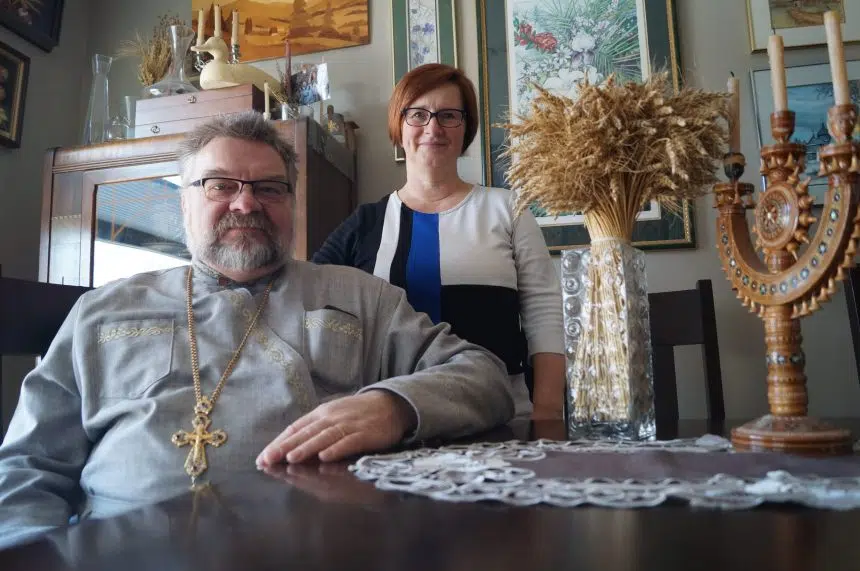Although the holiday season may have wrapped up for some, those of Ukrainian descent are ready to celebrate one of the holiest days of the year.
Jan. 6 is Christmas Eve in the Eastern Orthodox faith, which celebrates Christmas 13 days after a traditional, Gregorian calendar Christmas. In Ukrainian culture, instead of the Gregorian calendar, the Julian calendar is observed, according to Saskatoon Very Reverend Archpriest Taras Makowsky.
“The Christmas celebrations obviously start with the time of Christ being born, and this was a holy mystery because, of course, he was born of the Virgin Mary. According to the teachings of the Church, she was a virgin before the birth, during the birth and after the birth. S this is why the mystery is so important for us. The Ukrainian part of it comes in the establishment of the Ukrainian state,” Makowsky said Wednesday.
“We have a 40-day fast prior to the nativity celebrations … The church always has a fast period before a very special, holy day. The January 7th celebrations are special and unique to Ukrainian culture.”
Makowsky said what makes Ukrainian Christmas all the more special to him is the distancing from the obscurity of secularism or commercialism that society forces upon itself with the Dec. 25 celebrations.
He added that of Saskatchewan’s population, well over 100,000 individuals are of Ukrainian descent. That’s something that makes our province so unique.
“It’s just such a fantastic province to live (in). It’s a melting pot for many different cultures and many different nationalities. I think that’s what makes it special in Saskatchewan is that melting pot of nationalities that helps us to have these glorious celebrations and to respect everybody’s culture,” he said.
In addition to Saskatchewan, Ukrainian-Canadians can be found across the country. Canada is home to the third-most people of Ukrainian heritage aside from Ukraine and Russia.
When asked how the Ukrainian tradition continues to hold strong within Saskatchewan, Makowsky said it goes back to living the faith, within the traditions, which all start within the home.
What does a Ukrainian Christmas Eve, and the celebration afterwards, look like?
On Wednesday night, a meatless supper full of 12 dishes will be served, along with an array of traditions that continue to be celebrated each year.
“The history around that is that the 12 meatless dishes are associated with the Gregorian society because Ukraine was established (as) basically a very large agricultural society and also there are some teachings that the 12 meatless dishes are associated with the 12 apostles … Some would even say that it is associated with the 12 months of the year,” Makowsky explained.
When the first star shows up in the evening sky, Makowsky said a sheaf of wheat — or didukh — is brought in. That signifies the grandfather sheep and all the forefathers who passed away before us.
It is then put in a special place, either near or on the table next to the icon of Christ’s birth.
The straw from the wheat is placed under the table, signifying the manger in which Christ was born.
Carolling is also an integral part of the celebrations, which begin the dinner. After the carolling, the first dish of kutya is taken. That’s boiled wheat sweetened with honey and signifying the people who have “fallen asleep in the Lord,” according to Makowsky. The kutya also is sprinkled with nuts and poppyseeds.
Also, the tradition of the new year’s bountiful harvest is fulfilled when that first spoon of kutya is thrown to the ceiling.
“I know in our home — we’ve been here in Saskatoon now, for 20 years — there are 20 spoons that hit the ceiling, and no one is going to paint it until I’m gone,” Makowsky said with a laugh. “It’s just a beautiful tradition.”
Many nuances have been introduced over the years, and much of the tradition depends on what is available to the people celebrating.
“Each one of these dishes, even the fruits or deserts, has a special meaning to them. So once you have your meatless dishes, once the meal is finished, we’ll start the Christmas carolling with the family … The family gets ready to go to the midnight service,” he said.
“The next day, January 7th, this is where you have a lot of the varying good times starting, celebrations, where people will go out to visit the homes of people within the community and go Christmas carolling … (which) will go right through to January 19th. That’s the Feast of Jordan and the water is blessed.
“It’s a holy mystery, that (the water) never spoils, for years and years to come,” Makowsky added.







